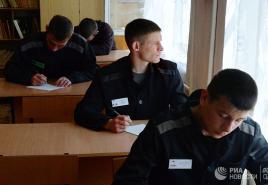How to prepare for the session? Reminder to the student and advice. How to prepare for a session How to prepare for your first session
Hello, dear readers of the blog site. So, the holidays have passed, someone, someone has combined business with pleasure, but for everyone the time to study has begun. The beginning of the semester in the first years always carries some charge of hope that in this semester everything will definitely be better than in the past. In senior years, students, as a rule, no longer believe that there can be something good, and if the first semester begins, then no one believes in anything at all, but only worry.
But we can talk, for example, about how to prepare for the session from the beginning of the semester. Is it possible that in general you need to do in order to be able to prepare for the session during the semester, and not waste time in vain.
Beginning of the semester
The beginning of the semester brings a lot of information - new subjects, new teachers, new requirements. If you have learned something about the teachers in advance, then we can say that you have prepared for the new semester. If you haven't learned anything, now is the time to do it.
Finding information about teachers will not hurt
And now, when you know everything about everyone, you can roughly estimate the action plan for the semester. If the teacher is demanding and has a lot of assignments, then the beginning of the semester is the point from which to start learning. If the teacher does not have a high level of requirements, then you also need to start studying from the beginning of the semester, it’s better then there will be time left to plunge headlong into a complex subject.
In general, the beginning of the semester, not only the first, but any - this is the time when it is worth starting to study. Not to attend a lecture and a practical lesson of each teacher once, but to really learn. I remind you of the principle, the earlier you sit down, the earlier you leave, at the university it works at 100%, and it’s also supplemented by the fact that the sooner you start completing training tasks, the faster you will find points in the task that you don’t understand, which means you have time to get help from teachers or classmates.
How to prepare for the session from the beginning of the semester
It is possible, and sometimes not even difficult. To begin with, you just need to ask the teacher what form of control awaits you - a test or an exam, and then find out if it is possible to get an "automatic".
If the answer is “there are no machines, everyone will take the exam,” then from the very beginning of the semester, complete the necessary tasks as much as possible, answer the lessons as often as possible, and do not miss classes. If it's not clear to you why you're doing it, then that's weird. Firstly, in this way you will gradually prepare for the session, it is always easier when preparing for the exam to read what you learned not so long ago and remember than to cram all the tickets from scratch. Secondly, you will be remembered by the teacher as a smart and diligent student, and questions will be much easier on the exam or test.
Thus, in this short article, we have analyzed how to prepare for the session from the beginning of the semester and what the beginning of the semester brings in general.
If the article seemed useful to you, please share it using the buttons below.
If you have any questions, write in the comments, I will try to answer as detailed and clear as possible.
It does not matter what kind of student you are - an excellent student who diligently prepares for each seminar, or a cheerful fellow who lives by the principle "it will work like that." In any case, at the word "session" your heart will echo somewhere in the area of \u200b\u200bpotatoes with ketchup.
As it usually happens:
- As a rule, you have questions for the exam a month before the day of delivery. During the first week of this month, you will definitely be visited by thoughts like: “Maybe I should learn something?”, “We need to start preparing already, time will fly by quickly”, etc., etc. And in response, your lazy alter -ego will say: “Come on, we will have time for everything, but now you can still do other things.”
- Approximately 8-9 days before the start of the exam, you start the countdown. "eight? Super, a lot! "7? A week? I can do everything." "6? Just right!". "5? What a beautiful number... "four? Yes, I'm starting to learn. Or no, I'm not starting, it's too early." "3? So, urgently cry to all your friends for your bitter share. Yes, you still need to post some cool status about the session.
- Two days before delivery. You are trying to remember where you threw the exam questions, and the notebook with lectures was so inopportunely lost. At 8 p.m., you will start looking with high hopes for answers in the almighty Google. At 12 at night, you will realize that you have not found decent answers to 40% of the questions, but your permanent desire to fall asleep will take over you. By the way, before falling asleep, you will diligently convince yourself that tomorrow you will wake up at 7 am and will study until nightfall.
- One day before the exam. Morning (contrary to your bright dreams) starts at 11 o'clock. This is the most beautiful day for the whole month. It is today that you go out several times to "breathe the fresh air", listen to a couple of albums in the player, pester all your friends with calls and messages - in other words, do whatever you want, just not to start preparing. Around 7 pm, you realize that you can no longer pull any further. Convulsively fall into the arms of books, abstracts and the Internet, go to social networks every hour and, noticing at least one classmate, experience a feeling of universal happiness. At 4 o'clock in the morning you realize that going to bed is useless.
I went to bed too late yesterday, I got up early today, I went to bed too late yesterday, I hardly slept. I probably had to go to the doctor in the morning, and now the train takes me where I don’t want to. Viktor Tsoi
In prostration, come to the exam, pull out a ticket, try to get random, school or hastily memorized knowledge over the past night out of your head. You go to answer, you pass, you get an assessment, sometimes even a very good one.
- You get home, meet the long-awaited Morpheus, sleep 5-6-7 (underline as appropriate) hours, wake up with mixed feelings: where am I, what am I, why am I?
- There should be a thought in my head: “I passed, I did it, I’m done!” (an analogy with the famous anecdote about the crow), but you understand that you are just tired.
How it should be:
Let's start preparing early
To save your nerves (which, believe me, will still come in handy), you need to start preparing 2 weeks before the exam. Before you start teaching, it is best to look through all the questions and find similarities between them: practice shows that about 20% of the questions turn out to be very similar, so that the answer to one of them can be “pulled” to another without any consequences.
A few words about cheat sheets
So so! For the invention I put "five", and for the subject - "unsuccessful". Operation "Y" and other adventures of Shurik
Writing cheat sheets is not only possible, but necessary. Do not download ready-made from the Internet, namely, write by hand, as in the good old days. When you try to fit 3 pages of printed text on a small piece of paper, you learn to choose the main thing. But it is not necessary to use cheat sheets on the exam itself. And why, because your mechanical memory functions perfectly, and you will reproduce the answer without the help of prompts.
Probability vs Murphy's Law
Of course, if you have not learned 2 questions out of 70, then, according to probability theory, there are high chances that you will not come across these questions on the exam. But we must not forget about Murphy's law. Moral: if you can't learn all the questions, you should at least read them. It will be very disappointing if you come across exactly the tasks that you decided to skip, right?
The day before the exam is a rest day
If you have been diligently preparing all the previous days, then on the day before the exam, it is better to arrange a well-deserved rest for yourself. Spend time in nature, meet friends, re-read your favorite book since childhood - in a word, do something pleasant. It’s also better to go to bed early: you need to get a good night’s sleep and rest in order to conquer the “exam peak”.
The right attitude
If you think you can, you are right; if you think you can't, you're right too. Henry Ford
An important role is played by your psychological attitude during the exam. Be confident! Smile, while answering, do not hide your eyes, but try to look the teacher in the eyes. Watch your hands, they often give out excitement. If you constantly twirl something in your hands or nervously link them together, then it is better to hide your hands under the desk altogether. The most important thing is to always keep in mind the idea that you can do it. How could it be otherwise?
How do you prepare / prepare for your exams? Write in the comments!
The session is a difficult time even for the most diligent students. It happens that the material learned by heart jumps out of my head from one type of ticket on the teacher's table. What to do if the excitement of the exam makes it difficult to concentrate? How to get into the category of lucky people who go to the session as if it were a holiday? Is it possible to turn the preparation process into an exciting activity? These and other questions of a BelTA correspondent are answered by the head of the psychological service of the Belarusian State University, a practical psychologist of the highest category Ruslan Popok.
Students during the session must follow the 5 golden rules.
First, you need to correctly distribute forces
. Analyze, for example, your schedule: which exam is more difficult, which is easier. Take notes from classmates for missed lectures. If some topics were slow during the semester, flip through the textbooks again.
In addition, in the process of preparation, it is important to take into account that any person has his own biological rhythm. Each of us has a rise in strength, moods are replaced by a decline. The difference is in the interval, so one can tirelessly sit over textbooks for half a day, the other for two hours, and after 20 minutes someone is drawn to put the notes aside. In any case, your biorhythms can and should be used for good: during the period of energy upsurge - to teach, and when activity subsides - to repeat the past.
Second, avoid cramming. Mechanically memorized text tends to irrevocably disappear from memory during the exam. And to prevent this from happening, knowledge needs to be systematized. Studying the material on a particular examination question, try to remember the most important thing. This information will serve as a kind of beacon in the future. If you remember the key fact, formula, date, then something else that you read on this topic will certainly come to mind. This approach gives a much greater effect than simple memorization. By the way, the teacher helps to arrange the beacons correctly during the consultation, so you should not skip them.
As Ruslan Popok notes, during the session, students often come with a request to help them relieve stress. Many people think that you need to prepare for exams, literally, without raising your head from textbooks. But that's not the case at all. Vacation planning is the third golden rule of a successful student. “Go to the theater, cinema, sit in a cafe with friends, or at least take a walk in the fresh air,” the psychologist advises. Do not be afraid that you will lose time and you will not have time to learn something. On the contrary, after the rest, the working capacity will increase.
The fourth rule - pay attention to your diet, which should be complete and balanced. You can’t refuse dinner supposedly because you need to prepare. The feeling of hunger will not help to learn the material being studied well - rather the opposite. For the duration of the session, also forget about diets. After all, even the most gentle of them is stress for the body, and then there are exams. Double load! Experts strongly recommend excluding energy drinks from the menu. Their effectiveness may be high, but short-lived. Then invariably comes a decline in strength, which can be difficult to cope with.
And finally, the fifth. Go in for sports. During the session, students mostly lead a sedentary lifestyle. However, doing exercises in the morning or going, for example, to the pool will not hurt. On the one hand, this will relieve stress, and on the other hand (experts have long established this) - the level of physical activity directly affects the state of mind.
 Just before the exam, try not to wind yourself up. Do not ask those who have already passed how everything went if you feel that you are starting to worry even more about this. Step into the classroom with confidence. With all your appearance, show that you know everything. The point is not to impress the teacher, explained Ruslan Popok, in this way you yourself tune in to success.
Just before the exam, try not to wind yourself up. Do not ask those who have already passed how everything went if you feel that you are starting to worry even more about this. Step into the classroom with confidence. With all your appearance, show that you know everything. The point is not to impress the teacher, explained Ruslan Popok, in this way you yourself tune in to success.
After pulling out the ticket, put it aside and let yourself know that you are ready to answer the questions that are included in it. Calmly prepare your workplace: get a pen, a sheet of paper. Rewrite the first question, then the second. Habitual actions help to defuse the situation: nothing unusual happens, which means there is nothing to worry about.
Psychologists recommend starting work on a ticket with a question that seems easier. Having outlined the answer scheme, do the same with a more difficult task. Then go back and complete the previous answer. Such, at first glance, leapfrog also helps to create a sense of success. If necessary, you can dilute the answer with information from related areas. Useful if the teacher starts asking additional questions. Some may be confusing, but in this case it is important not to lose confidence.
“Don't ever make excuses. I, they say, taught, read ... - Ruslan Popok loses the situation. - By this, a person first of all inspires himself that he is not ready. You need to confidently, in a businesslike way, ask to be given time to think. Taking a time out, try to rephrase the question, retell it in your own words. By doing this, you will tune in to the fact that you have begun to penetrate into the essence of the problem, self-confidence will return, and there the necessary date formula will come to mind. However, this option is possible if you really read something before the exam.
There is another simple tip on how to reduce the psychological stress during the session. Don't live with exams alone, live with what comes after - holidays. Make plans, make appointments with friends. And even better - think about how you will come to study, rested, wiser, gained experience.
By the way, the session is a stressful period not only for students, but also for teachers. Especially for the young. Those who are older are able to withstand the onslaught from some of the students. After all, sometimes young people argue like this: they will give me an assessment anyway, they won’t go anywhere. Someone, feeling that he is "floating" during the answer, begins to assert that the material on this topic was not given or was given insufficiently. Another complains of feeling unwell, some (more often girls) sometimes begin to cry. These tricks are as old as the world, teachers know them well and react accordingly.
However, it happens that a student really got into a difficult life situation or simply worked himself up before the exams. There are many maximalists among young people who tend to rush from one extreme to another, the psychologist noted. Today, a young man is infinitely confident in himself, and tomorrow there may not be a trace of his former confidence. An experienced and sensitive teacher will not aggravate the already difficult psychological state of the student, but he will not do concessions, perhaps he will offer to come again.

Questions on how to cope with exam anxiety, relieve stress, students are asked either shortly before the session, or after. Meanwhile, according to Ruslan Popka, it is necessary to start preparing for the session from the beginning of the academic year. Analyze your behavior in exams, highlight the pros and cons. Some may need to be more confident, while others may need to be more modest. As for the five golden rules, they can be successfully applied not only during the session, but throughout the entire academic year, the psychologist noted.
We are all different, so our strategies for preparing for the exam will be different. Start from your individual characteristics. If you are auditory, read textbooks and notes aloud, if you are kinesthetic, write according to your notes and plan your answer.
Another effective method is the mind map. This is a great way to structure information, refresh knowledge and quickly get to the heart of the subject even after a long time. We talked about how to make mental maps and how to work with them in more detail.
What questions to learn first? If during the semester you have a good understanding of the subject, proceed to the questions about which you have at least some idea.
If each new block cannot be understood without the previous one, then there is only one option: learn everything strictly in order.
It also makes sense to start with difficult questions, allocating enough time to study them. It's best to deal with them before you get tired and lose focus. Save the easy questions for later.
And be consistent. Stick to the chosen strategy, even if you start to panic with the approach of the exam.
Seek understanding, not memorization
Delve into the ticket, and do not try to memorize it. Memorization is a deliberately losing strategy, which also takes more time. Find logical connections in questions, invent associations.
Of course, in each subject there is information that you need to know by heart: dates, formulas, definitions. But even they are easier to remember if you understand the logic.
Do not tell the material in your own words, speculate so that the answer is more detailed.
Method "3-4-5"
A good method when you need to prepare for an exam in a short period of time. It will only take three days, but there is a lot of work to be done. Every day you need to work through all the material, but at a different level, constantly deepening.
On the first day, you read your entire abstract or training manual so that knowledge on the subject, roughly speaking, gets involved. We conditionally believe that you can already pass the exam for a triple.
On the second day, you deal with the same questions, but already from the textbook, in order to learn more details and subtleties. If you prepare diligently, you can already count on the four.
On the last day, you bring your answers to the ideal: repeat, fill in the gaps, remember. After the third day, you are ready to pass the exam with excellent marks.
Two days to study, one to review
The system is very simple: all the material must be divided into two identical parts and learned in two days. The third day is entirely devoted to repetition.
Set a time limit
You can delve into each topic indefinitely, so do not try to remember all the subtleties. From a large chapter in the textbook, highlight the main thoughts: structured material of a small volume is easier to perceive.
In we divided all the tickets between classmates and each prepared a short summary of his part. If your group does not develop mutual assistance, you can ask for materials and cheat sheets from senior students.
Don't get stuck

If you feel like you're sitting on one question for too long, skip it. The best motivator when preparing is a timer. Decide how much time you can spend on one ticket, such as 30 minutes, and when the time expires, move on to the next one. Set aside a few hours before the exam to deal with missed questions.
Make a ticket response plan
Any, even the most extensive question can be described in a few words. Moreover, each thesis should evoke associations.
Such a plan can be quickly reviewed before the exam to tune in to the working mood. There is a well-known method of three sentences: write out for each question a problem, a main idea and a conclusion.
Study depends on the subject
Not only you have individual characteristics, but also the subject under study. For example, the exact sciences - physics - require practice. For the humanities, it is important to be able to process large amounts of information, remember dates, names, definitions.
But, I repeat, the study of any subject must be approached actively: to delve into the issue and strive for understanding.
The format of the exam is also important. If you are preparing for an oral exam, say your future answers out loud. My favorite tactic is to retell the material to someone at home or, when they are not enthusiastic, to myself in front of a mirror. Even better, if someone will not only listen to you, but also ask questions when something is not clear.
If you are preparing for testing, it is worth solving a dozen typical tests, writing out your mistakes, repeating problematic topics and solving everything again.
If the exam is written, you need to think over the structure of the answer in advance.
Prepare for two or three
Write down the most difficult, in your opinion, topics - the collective mind will help you deal with them faster. It is better to cooperate with classmates who are determined to study, otherwise the preparation for the exam can turn into an ordinary pleasant meeting with friendly conversations.
No, this does not mean that joking and relaxing is forbidden. Just remember the main purpose of the meeting.
 Viktor Kiryanov/Unsplash.com
Viktor Kiryanov/Unsplash.com - Take breaks. This will help you relax and sort out new information.
- Turn off your phone, stay away from social media, stay away from the TV. If you can't resist the temptation, read up on dealing with distractions.
- Get enough sleep.
- Do not forget about food: it will give extra strength to your body. However, you shouldn't overeat. Usually, after an overly heavy lunch, he begins to sleep, and he doesn’t want to study at all.
- Avoid negativity from other people. The atmosphere during classes should be as favorable as possible.
- Don't rely too much on cheat sheets and cheating. And if you don’t know how to write off well (you must agree, you also need to be able to do this), you shouldn’t even start.
- Arrange a place for classes: bright, comfortable, with all the necessary materials at hand. The bed is not the best option: there is a high probability of falling asleep on a boring topic.
- Make bulleted lists: they are easier to remember.
- Sports will help to relax and stretch the muscles that have become stiff during prolonged sitting. In addition, while running, cycling, or similar physical activity, you can slowly reflect on complex issues.
- If you feel that you are not in the mood to study, start with the topic that seems most interesting to you. This will help you get on track.
- Walk in the evening. During preparation, the nerves are usually on edge, so you need to relax a little.
- Make a clear preparation plan.
This is how I passed all 5 exams in the winter session. Moreover, it was prepared not in 10 days, but in 3. There were about 50 questions for each subject; I closed at home 3 days before the exam and studied 15-20 questions a day, sometimes 10 each. Those that are most difficult for me, I skipped at all, it’s good that I didn’t come across them on the exam. In fact, learning 10-15 questions a day is quite realistic, and the last 5 (in order to at least finish 20) are already starting to read through the line.
Something like this. And I took mostly humanitarian subjects, where I also had to read works, articles, learn poems for some questions and memorize laws, and so on. In short, if you have 10 days, then you can easily distribute the questions for these days and calmly teach, and on the 10th day go over everything.
One of the most useful skills in the tower is the ability to analyze and process large amounts of information. The bottom line is that you need to learn how to explain complex things in simple terms. Learn to extract the main theses from the information and draw up a squeeze of the essence from large volumes of information, omitting the water.
This way you can reduce the amount of information you memorize many times + you can create special "question traps" for teachers - when you keep silent about what you probably know, if the moment is important - with a high degree of probability you will be asked this question as a suggestive one.
In general, according to the students' own experience, the best way to memorize large amounts of information in a short time is to write cheat sheets, even if they are not used during the exam. When writing cheat sheets, you use a large number of types of memory (at least 3-4) and after such manipulations a considerable amount of information settles in your head, of course, there will be questions about its quality and understanding, but at least you can say at least something distinctly and not slide into a complete file. I made cheat sheets in the form of small books sewn with a thread of cut paper with a size and thickness not exceeding the dimensions of a matchbox - this format will limit you in size => you will have to analyze and compress information - write small paragraphs of 1-2 sentences, key terms, formulas, abbreviations , graphs or chart shapes. Some concepts can be transformed into pictures - try to explain all this to yourself, imagine them as mental images - everything will be postponed. The better and clearer you explain the material to yourself, the better and clearer you will be able to present it to the teacher on the exam. No fluff! Not a pen!
PS Somehow I passed the exam like this for the 4th course and the teacher asked how I prepared. I honestly said that I wrote spurs, the teacher asked me to show - I gave my little book, in principle I already knew the material well by that time. The teacher leafed through the spur and gave it back with the words “I’ll put, perhaps, an automatic machine - a good cheat sheet, I think you know all the material without it” - put 4.
- Take a good basic textbook on the subject and read it through from cover to cover. If there is a list of references for the course, and it is not in alphabetical order - the very first of it. If there is no list, choose the most complete one (not the largest, but the one with the most topics) or the one that matches your list of questions as closely as possible, if one was given to you. Some teachers even take the wording of questions from the titles of textbook paragraphs. Probably, in the answer they want to hear about the same thing that is stated in the paragraph. If you have found several textbooks, in order to decide which one suits you best, read the paragraphs on the same topic in them, choose the one where it is shorter and more understandable.
Reading the entire textbook in a row will help you understand the logic of the subject itself, the relationship between topics, give you knowledge of basic terminology, and for a number of subjects - show how this science developed in general - from its origins to the latest research.
Take a terminological dictionary on this subject. Refer to it as you read the textbook if you come across incomprehensible words. When you start writing responses to specific questions, I recommend that you start them by defining the terms contained in the question.
Get a thick notebook in which you will write answers (to specific questions or a short summary of the main points of the program). Take one or two spreads for each question, number the pages of the notebook, write the contents / paste the list of questions on the flyleaf and add to it the page numbers of the notebook where you will write the answer. Try to write answers briefly, but always structured, it is advisable to come up with a structure suitable for the maximum number of answers. For example: the main term, what it is (definition), who discovered/introduced the concept and when, who studied it, what varieties it has, how it works. A short but structured answer tends to be easier to remember and ultimately ranks higher than off-topic water. Is there room left? Excellent! You can add additional details there if there is time left or they will meet when studying another topic.
If you have a lecture notes - number the pages there and in the answer book refer to those places where any information on this topic is contained. If you don’t have your own abstract, but someone else’s xeroxed, spurs from the Internet, etc - arm yourself with scissors and glue, transfer the most important data from there to your notebook. Do not get carried away by volume: the answer to a question on most subjects can fit in a notebook spread!
If possible, cooperate with classmates, share questions and exchange answers. Modifying someone else's basic answer is easier and faster than compiling your own from scratch.
After writing 5 questions, reread them. Do this for every five questions. If the list allows you to select specific topics for which a certain number of questions are assigned, reread by topics.
If you are distracted by extraneous activities, prepare for an exam in the library or computer lab, there are fewer distractions.
In the last evening and night, DO NOT LEARN AND DO NOT READ ANYTHING! Take a walk in the fresh air, go to bed. Get up early in the morning and reread your entire preparation book.
Good luck!
Law graduate, lover of literature, lover of psychology, art lover, mini-journalist in the past, hopeless individualist, future traveler and teacher, seamstress-knitter-draughtswoman-decorator-attacker, mother's daughter
My method is this. It may not be suitable for everyone, but for me and my fellow students this is the best way.
So, we take an electronic list of questions and find answers to each of them in netik. While we are looking for an answer on different sites, we are viewing the information and filtering it, because we need a complete and at the same time compact answer. Each answer is edited, unnecessary and non-specific information is discarded, the main terms and classifications are highlighted, a beautiful design is made (you draw up, but the eye remembers). At the end, you can print and read while driving to the exam, standing in line, and so on.
After such preparation, it is enough to read the resulting text at least once, and the chances of passing well will be for sure. And if you read it 2-3 times, you might even get a penny :).
It can take a maximum of two days for this, along with learning, if there are about 100 questions, and then one day.
Learn superficially each topic to begin with, and on the remaining days (there will definitely be 1-2 of them), supplement with details. So avoid porridge in your head and you will know not in fragments, but at least a stable minimum
If the subject is humanitarian, then outline the textbook. Very short, but concise. If technical, then: 1) tasks. If there are tasks, you should analyze the ready-made solutions of your friends or examples from the textbook. And the oral part of the exam - learn the definitions and formulations of theorems, and spur or bombard the evidence
Usually, if you do nothing at all, then you will not be allowed to take the exam, but if you are already lucky and you are going to the exam, then 10 days will be enough to read the textbook on this subject, which is usually enough to successfully pass "C grade"
If you have less time left, for example 1-2 days and you don’t know what to do, then I advise you to stock up on coffee, find a list of questions for the exam and analyze each question separately and make cheat sheets
Often, there are already ready-made answers for exams in electronic form, made in the form of cheat sheets, it is even easier to prepare for them, you do not waste time searching for information on questions of interest
It is important to concentrate all your attention on preparation and not be distracted by anything, using your time as productively as possible, use the 50/10 method
50 minutes work, 10 minutes rest
It is advisable to find out in advance how the exam is going and if there are several examiners, which one is more loyal and try to get to him
You need to sleep at least 4 hours and repeat everything in advance before the exam
If the exam is oral, when answering, behave confidently and not show doubts about your knowledge
When answering the examiner’s question, try not to answer “I don’t know”, “I don’t remember”, it’s better to try to express your assumptions, try to reason on the topic of the question asked and reduce it to another, the answer to which you know
Usually 2-3 days are enough to prepare for the exam, in 10 you can close the session)
Attention! Answer from rasp... an unlucky student.
And the goal is to prepare or pass it?
If the goal is to turn it in, then the idea of \u200b\u200b"paying" immediately comes to mind. Yes Yes. No need to minus, you can pay anyone, the approach is important. I remember a case when a student took money in microloans, paid, and later got a job and worked off his debt. But this is an extreme case. There were also students on scholarships who saved it up in order to stay on the "golden chair" with it. (Well, this is if, in addition to it, you have other ways to earn money.)
Now to the topic of the question. It really depends on the specialty, of course. And the number of items. In my case, it was worth remembering (understanding) the basic principles of the topic, and on the answer, when it came to the nuances of pouring water or answering “next”.
You can learn tickets on the principle of a chessboard. (Through one). Answering amazingly, to one question, the teacher, with a high degree of probability, will not waste time and ask you about the second or third. But it very much depends on the teacher and his opinion about you, the number of students in the queue, etc.
We wrote about cheat sheets above. A very effective way to remember. The material is remembered even better when you re-explain it to someone. This is how I trained on my little nephew.))
Personally, I wrote my thesis with a volume of Over 350 sheets in 13 days. This is subject to checks of all sections and the collection of signatures of managers. Since I was the last to write it, I simply collected a bunch of information from other students from the class and made a combined hodgepodge, fitting it to my topic. While doing it, I read the information diagonally and, willy-nilly, remembered what was discussed in the sections.
And of course, the basis for successful preparation in a short time is a clear attitude to work and full dedication to this business. (+ A bunch of energy drinks and sometimes even drugs.)
P.s. I will not speak for everyone, but it seems to me that you get real knowledge only directly at work (practice, internship, being a cadet ...). The university, thanks to such situations, taught me to negotiate with people, to spin, to be slippery and quickly find a way out of seemingly stalemate situations.
Things are a bit more complex than the above answers, I'm afraid (with all due respect). There are no advisers here. It all depends on your personal "skills": the speed of assimilation of the material, perseverance, inquisitiveness, etc. Here you can only answer this question: how to pass the exam?
Yesterday I had a comprehensive (theory of state and law, criminal law, criminal procedure, prosecutor's supervision, civil process within the framework of prosecutor's supervision) state exam (I passed it with a "4"). Believe me, I am not one of those people who can carpet long and hard on the fabulists of pundits, so the only chance for me to learn the subject is lectures where you can snatch knowledge.
So, the first and most important rule (no matter how trite it may sound): do not be nervous, stress can knock out of you the rest of the knowledge that you knew and learned with iron concrete. Secondly, the night before exams / tests, you need to eat well and sleep, distract yourself from your studies with some pleasant thoughts (seals, a rainbow, our Crimea, a bright future). And the third - do not allow thoughts like "well, f..na, I will not give up the end of me" - gloomy thoughts about a hopeless future may affect your "thinking".
Good luck, you'll be fine.
P.S. I know, the answer is a bit off topic, but in my opinion, it is relevant, because. at this stage, you are more interested in passing successfully, rather than gaining knowledge.
With respect and reverence to the brother student BAV.







